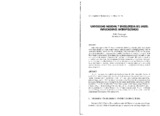Universidad medieval y enciclopedia del saber: implicaciones antropológicas
Autor
Andonegui, Xabier
Editor
UCOPressFecha
1996Materia
HumanismoCiencia árabe
Aristóteles
Filosofía medieval
Universidad
METS:
Mostrar el registro METSPREMIS:
Mostrar el registro PREMISMetadatos
Mostrar el registro completo del ítemResumen
Lejos de los tópicos sobre el llamado «oscurantismo» medieval, la dinámica global socio-cultural
de los siglos XI-XIII es de signo inequívocamente humanista, aunque su principal problema reside en
conservar Ia tradición cristiana heredada, actualizándola y finalmente enriqueciéndola con las aportaciones de la ciencia árabe y el pensamiento aristotélico conocido en su esplendor. La creación de la Universidad, la reestructuración de los saberes bajo Ia guía de Ia ciencia aristotélica, los conflictos recurrentes por mor de mantener la hegemonía de Ia teología en Ia formación del hombre medieval, se
entienden mejor vistos desde Ia básica confrontación de dos concepciones del hombre en cuanto «imagende Dios», una propendiendo a Ia sumisión y otra conducente a Ia autonomía. Entre ambas mediarán las grandes figuras: así Anselmo, Tomas o Escoto lo harán en distintos momentos del proceso y desde supuestos distintos, transmitiéndonos un modelo basado en Ia complementariedad jerarquizada de ambas perspectivas. Far of the topics about the so called medieval «obscurantism», the global sociocultural dynamic of
the XI-XIII centuries is unequivocally humanist, although its main problems consists in conserving the
inherited Christian tradition, rejuvenating as well as enriching it with the arabian science and the aristotelian thought, known in their splendour. The creation of the University, the reconstruction of the
know ledges with the guide of the Theology in the education of medieval man, can be better understood,
looking at them from tbe basic confrontation of two conceptions of the man as «image of God»: one
of them, tending to the submission, and the other one, tending to the autonomy. Between both tendencies,
the great figures as Anselmo, Thomas or Scot will mediate an agreement. They do it in different
moments of the process and from different suppositions. But they all transmit to us a model based in the
complementary hierarchization of bot perspectives.

